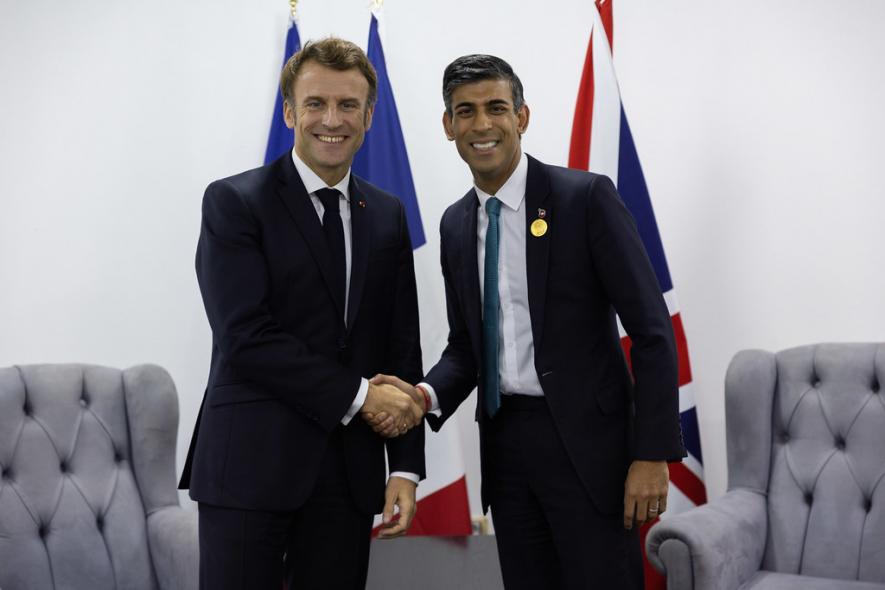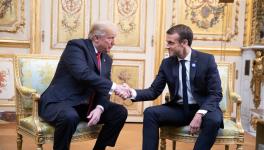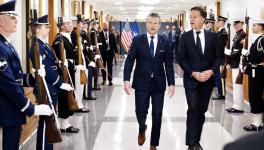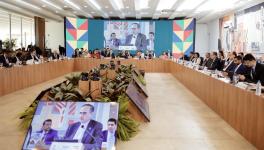Britain Rebuilds Ties With France

Rishi Sunak, prime minister of UK and Emmanuel Macron, president of France. | Image courtesy: flickr
A Bloomberg report cited unnamed British ministers, diplomats and officials to the effect that Prime Minister Rishi Sunak has tasked senior ministers and officials to draw up plans for rebuilding the UK’s relations with the EU after years of acrimony since Brexit, “across a range of policy areas” on defence, migration, trade, energy and international standards.
Britain hopes to come up in the coming days with a new initiative on post-Brexit trading arrangements for Northern Ireland. The policy shift is projected as “a reflection of a changing reality” rather than an admission of the colossal failure of Brexit.
The “changing reality” could be anything ranging from the political necessity for Sunak who completed his first 100 days in office as PM to showing dynamism as the country heads for general election next year. But the signs are that Britain could be in the long game.
In politics and diplomacy, the sub-plot often turns out to be more far-reaching than the main plot. In the present case, the Brexit is the main plot but laying the foundation for a more comprehensive improvement in the UK's ties with the EU bloc constitutes a consequential sub-plot that is even more momentous.
Sunak’s blossoming personal equations with French President Emmanuel Macron pave the way for cooperation with France, as Europe’s power dynamic after the yearlong Ukraine conflict is evolving. Sunak and Macron are on the same page on Ukraine, although the UK is far more vocal and takes a hands-on role in the war. Last week, the Ukrainian President Volodymyr Zelensky travelled from Kiev to London and then onward to Paris to meet Macron on a British government plane.
Sunak and Macron have much in common as two highly educated and erudite politicians. Politico dubbed them as “two peas in a pod” who favour tailored skinny blue suits; Guardian celebrated it as a “bromance” of two ex-finance ministers with common threads in their backgrounds and routes to politics. (Both are millionaires and the eldest sons of doctors!)
That said, the UK and France are great powers with a rich historical memory who wouldn’t act impulsively. In the context of the realignment under way in European politics since the war began in Ukraine, there is an opportunity and need to reset Franco-British ties. Both countries are at sea without a compass, as past certainties — the EU anchor sheet for Sunak and the Franco-German axis for Macron — have vanished.
The pomp and ceremony of the 60th anniversary of the Élysée Treaty in Paris on January 22 exposed the futility of recapturing the verve of the Franco-German axis in the dramatically changed milieu in European politics. As for post-Brexit Britain, it finds itself in a cul-de-sac and is struggling to figure out an exit strategy.
The future challenge for both countries is about the need to work on a way ahead toward the “big picture” of European integration while also seeking compromise and a common path on many complex and difficult policies where national interests may be divergent.
At the time of the Brexit negotiations six years ago, Britain didn’t reciprocate the EU’s push for more defence cooperation. On the contrary, one of the proposals under consideration in London currently is a formal defence and security relationship and dialogue between the UK and EU, as well as a legal agreement to more easily allow the British military to join EU operations.
Macron no longer says that the NATO is “brain-dead.” On its part, Britain intends to propose a plan at the NATO summit in Lithuania in July for a defence budget by member states going beyond the group’s existing commitment to spend 2% of GDP on defence.
Sunak will be inclined to accept the UK Defence Secretary Ben Wallace’s call for greater investment in Britain’s Armed Forces, and a post-Ukraine update to the Integrated Review of British defence, security and foreign policy, which is due in the coming weeks. In political terms, he is consolidating his credentials to lead his party.
On the other hand, the recent heated behind-the-scenes disagreements with Germany regarding the Ukraine war on issues such as tanks saw France and the UK more aligned on foreign and defence policy than at any point in decades. Historically, the UK and France have the most powerful militaries in Europe. But the so-called Zeitenwende is Germany’s biggest rearmament since World War II.
What is unspoken is about the trend toward the rearmament of Germany and about the global role that Berlin will play. Two days after Russia’s special military operation began in Ukraine, in an emotional speech to the Bundestag, Chancellor Olaf Scholz declared: “We are experiencing a Zeitenwende.”
The Zeitenwende becomes a watershed moment, a changing of the times, a “turning point” in German security policy, as Scholz promised to raise military spending to at least 2% of GDP and create a 100 billion euro defence fund. The ratings of Scholz and his Social Democratic Party soared.
The Bundeswehr may be in some ways a domestic political project but it has a foreign policy dimension. The Zeitenwende will make Germany’s military budget the third largest in the world, coming after the US and China and leaving France and the UK trailing behind.
Indeed, the game between all major European parties around the West’s conflict with Russia has intensified, and the geopolitical situation in Europe has undergone drastic changes, too. It is against this tumultuous background that Poland has sought nuclear sharing with the US to relieve its own security pressure.
On September 1, the 73rd anniversary of Germany’s invasion of Poland, Warsaw released the final report which maintained that the country was entitled to approx. $1.39 trillion as war reparations from Berlin. Following Germany’s refusal to pay war reparations, Poland is calling on the US and the UN for support.
Britain and France would also know only too well from history that militarisation does not guarantee peace. With the Zeitenwende, Germany is set to become a cornerstone of conventional interstate war power in Europe. And the machine behind this will be a German military-industrial complex.
Enter Seymour Hersh. The investigative report by the renowned American journalist Seymour Hersh on February 8 lays bare that the US Navy executed the sabotage of the Nord Stream gas pipelines and, furthermore, that the White House National Security Advisor Jake Sullivan himself oversaw the plans for the covert operation — even before the Russian operation began in Ukraine.
This sabotage is the culmination of a long-term American strategy dating back to the cold war era to dismantle the extensive economic links between Moscow and then West Germany and prevent their relationship steadily moving toward an alliance in Europe in the most recent decades.
The US oil companies have profited immensely by shifting German energy consumption away from Russia in the wake of the Ukraine crisis, which has also created a difficult environment for broader German industry as a competitor to American goods.
Hersh’s report deals a humiliating blow to German pride and national honour. There is deafening silence in official Berlin, although animated debates have appeared in the public domain. What ensues as Germany’s response can only be known if and when the Ukraine conflict ends. But the Biden Administration is in no hurry to end the conflict and is instead leading from the rear a campaign to lock in Germany to the frontline in the fight against Russia.
A more dangerous world is ahead, which dictates that there is no choice but to work closely with allies. This means Britain and France moving away from the past collisions with each other and toward a more stable relationship as critical friends.
MK Bhadrakumar is a former diplomat. He was India’s ambassador to Uzbekistan and Turkey. The views are personal.
Get the latest reports & analysis with people's perspective on Protests, movements & deep analytical videos, discussions of the current affairs in your Telegram app. Subscribe to NewsClick's Telegram channel & get Real-Time updates on stories, as they get published on our website.
























